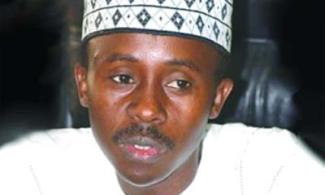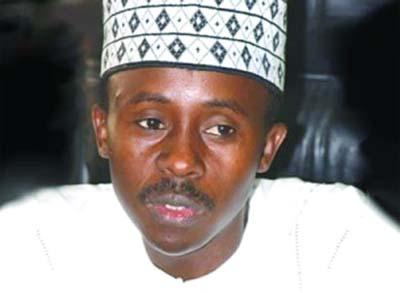
The most recent scheme to stall the trial was unveiled in a petition to the Chief Judge of the Federal Capital Territory, Justice Ishaq Bello, in which Mr. Lawan sought the transfer of his case to another judge.
Mr. Farouk Lawan, former Chairman of the House of Representatives Committee that investigated the Federal Government fuel subsidy payments in 2012, appears to have, again, succeeded in frustrating his ongoing corruption trial. SaharaReporters' investigations revealed that Mr. Lawan, who was a member of the House of Representatives between 1999 and 2015, has been abetted in the scheme by his lawyer, Mr. Mike Ozhekome (SAN).
The most recent scheme to stall the trial was unveiled in a petition to the Chief Judge of the Federal Capital Territory, Justice Ishaq Bello, in which Mr. Lawan sought the transfer of his case to another judge. He is facing trial on a three-count corruption charge related to his receipt of $500,000 out the $3million bribe he allegedly demanded from businessman Mr. Femi Otedola, a subject of the probe carried out by the committee headed by Mr. Lawan.
On June 21, an Abuja High Court sitting in Jabi fixed 5 July for Mr. Lawan's re-arraignment. He will be docked before Justice Yusuf Halilu, who will be the fourth judge handling the matter. Following Mr. Lawan's petition, which mainly complained about the refusal of Justice Angela Otaluka to grant adjournments for Mr. Ozekhome to personally appear, the Chief Judge of the Federal Capital Territory directed. Justice Otaluka to withdraw from the matter.
The case began before Justice Musdashiru Oniyangi, who handed over to Justice Adebukola Banjoko of the Federal High Court, Gudu, Abuja. Justice Oniyangi was elevated to the Court of Appeal. In 2014, Justice Banjoko withdrew from the case, following an application demanding her withdrawal by Mr. Ozekhome. Mr. Lawan personally wrote a petition against the judge, alleging that the judge was close to Mr. Otedola.
Mr. Lawan's request has been robustly opposed by the prosecution counsel, Chief AS Awomolo (SAN), who is representing the Federal Government.Mr. Awomolo, in a petition, dated 8 June, to the Attorney-General of the Federation, said Mr. Lawan has become "notorious for making undeserved allegations when he feels he is going to lose".
SaharaReporters was told that Messrs. Lawan and Ozhekome made the latest move to ensure that Mr. Lawan has a window to contest the election in 2019.
In his petition, dated 21 March 2017, Mr. Lawan claimed that he has lost confidence in Justice Otaluka of Federal Territory High Court 28 to be fair to him. His loss of confidence in the judge, he claimed, is based on his personal experience, which he said has been characterized by prejudice.
At the proceedings of 9 February 2016, Mr. Lawan alleged that the court refused to entertain his motion challenging its jurisdiction when Justice Otaluka ordered the prosecution to call witnesses for the trial to proceed despite the pendency of his motion challenging the court's jurisdiction. He also alleged that when the court ordered the trial to commence, it was a junior lawyer from Mr. Ozhekome's chambers that was on hand to defend him. Mr. Lawan said the junior lawyer applied for an adjournment to enable Mr. Ozhekome to appear in person since he is the lead counsel, one he considers a match for Mr. Awomolo, the lead prosecution counsel.
The application, he said, was rejected by the court, which ordered the junior counsel to proceed with the hearing, a decision he said he was dissatisfied with but over which he took no action.
"Though I was highly dissatisfied with the said decision of the court because I had not even briefed the said counsel, who appeared on the said date, I did not take any step because the trial just commenced and I was hoping that the necessary time and facility to get the best of legal representation so that justice will not only be done but be seen to have been done in the circumstances of this case," he wrote in the petition.
On three other occasions, alleged Mr. Lawan, Justice Otaluka displayed conduct he considered prejudicial to his trial. At the proceedings of 14 March 2017, said Mr. Lawan, Mr. Ozhekome, who had previously cross-examined the second prosecution witness in the case, was absent. The junior lawyer from his chambers continued the cross-examination of the witness. The lawyer added Mr. Lawan, then informed the court of his need for an adjournment. The lawyer had argued that since the case was adjourned to 14 March, it could be adjourned to the next day to enable Mr. Ozhekome conclude the cross-examination of the second prosecution witness. The court rejected the request for the cross-examination to continue the next day, discharged the witness and ruled that the trial would continue the next day.
"It is pertinent to point out that at the two previous proceedings (31 January 2017 and 7 February 2017) before 14 March, the prosecution had sought for two adjournments on the ground that their witness was away on a national assignment and hence could not be available for cross-examination by my lawyer. The adjournments for 14 and 15 March were granted the prosecution without the court foreclosing and dismissing PW2," said Mr. Lawan.
On March 15, he claimed Mr. Ozhekome was also unavailable because he was in Lagos in connection with the freezing of his account by the Economic and Financial Crimes Commission (EFCC), which made him send a junior lawyer. Mr. Lawan, however, said he told the court that he had no confidence in the junior lawyer and proceeded to apply for an adjournment. He claimed that the court did not ask him why he lacked confidence in the junior lawyer before refusing the application. Justice Otaluka explained that the junior lawyer was competent to represent Mr. Lawan, as the offense for which he was being tried was not a capital one. She called the junior lawyer to proceed.
That day, noted Lawan, the prosecution called a third witness. The junior counsel, he said, objected to the admissibility of certain documents sought to be tendered as evidence. The court dismissed the objection. While acknowledging that the judge could exercise discretion in rejection or admission of evidence, Mr. Lawan said he believed Mr. Ozekhome's presence would have made the difference.
Mr. Awomolo complained that Mr. Lawan's matter was always transferred to the Chief Judge of the Federal Capital Territory, who never gave the prosecution an opportunity to make an input by pointing to Mr. Lawan's antecedents. The prosecution counsel stated that every transfer implies a fresh trial before a new judge.
The prosecution had tendered a video before Justice Otaluka, showing Mr. Lawan receiving a parcel from Mr. Otedola. Mr. Ozekhome had countered that there was nothing to show in the video that what Mr. Lawan collected was money. He also said the video had no audio, therefore it could not be said to contain a discussion on bribery.
